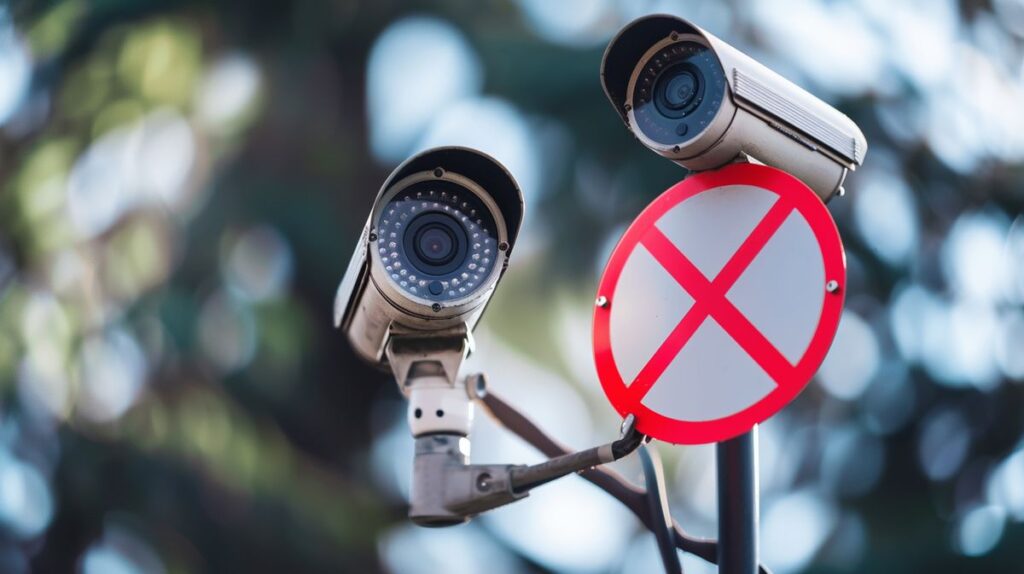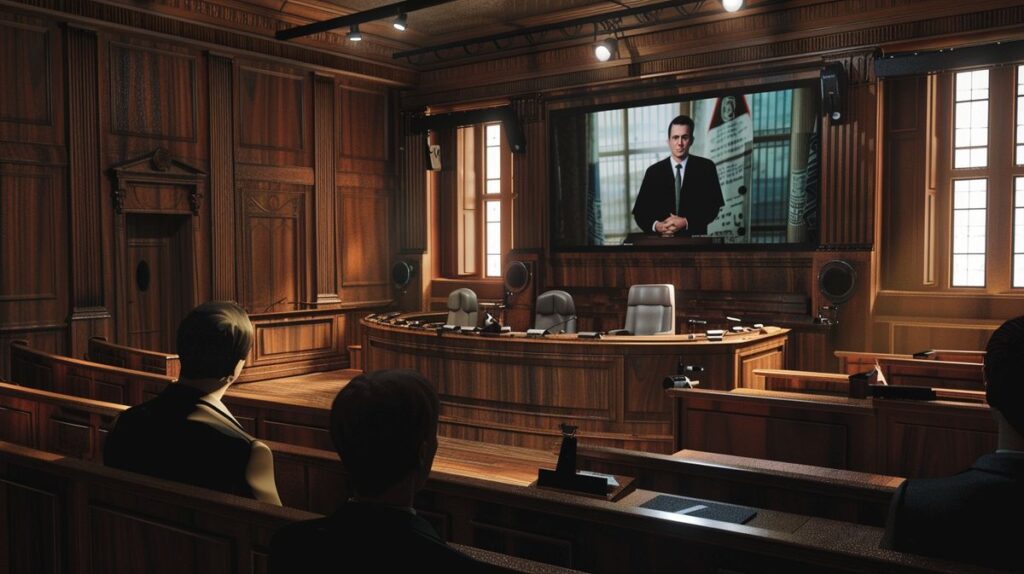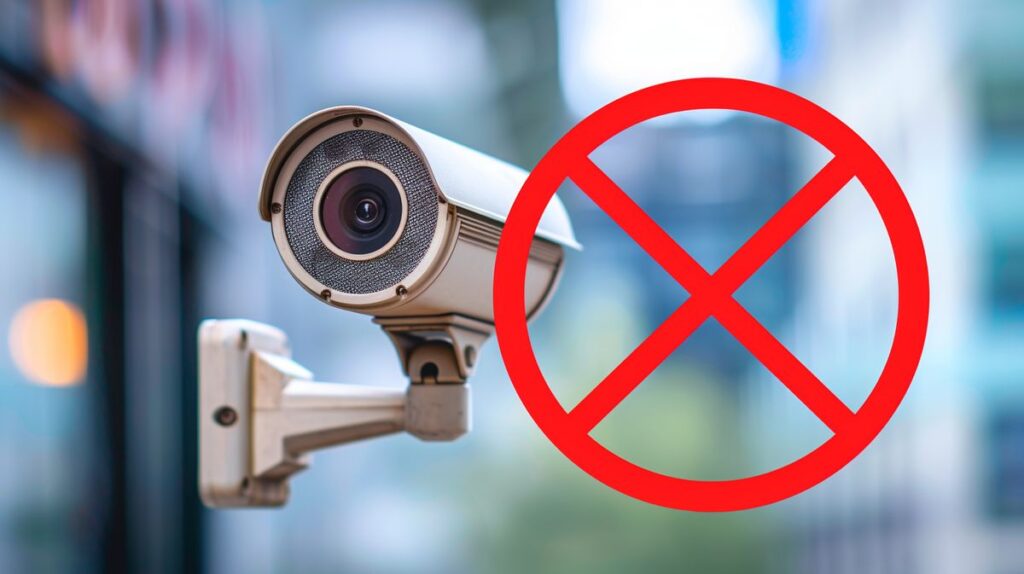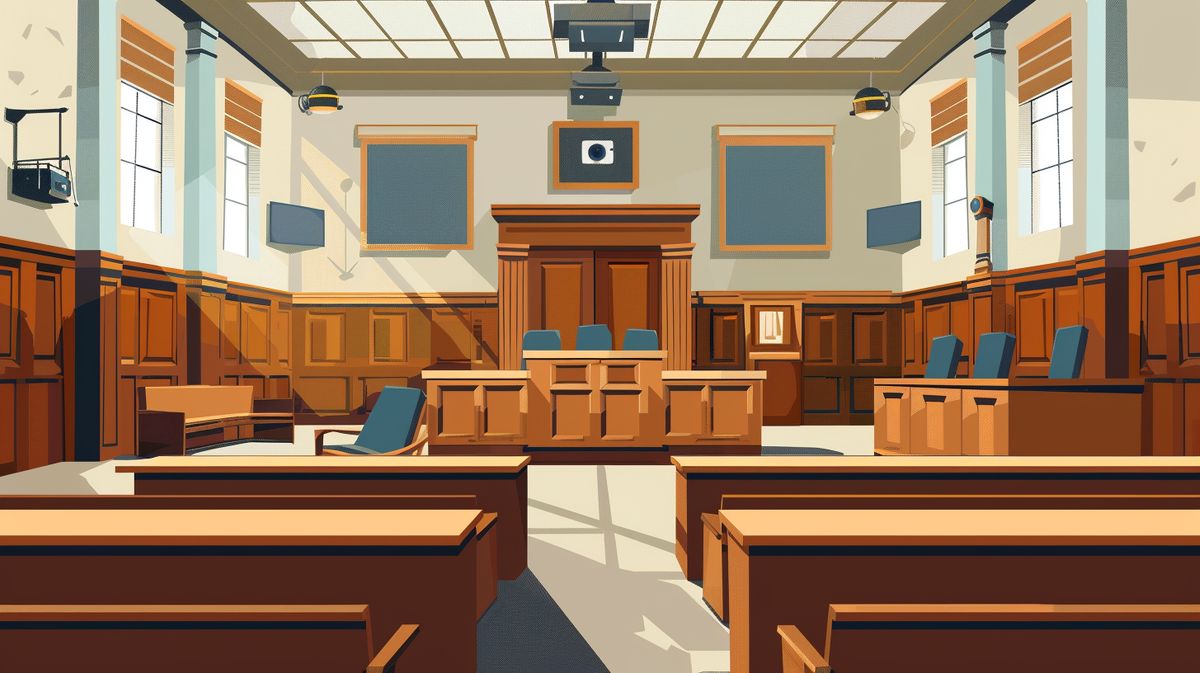Understanding “Is Recording Audio on a Security Camera Illegal?” – Facts and Laws
Did you know that recording audio on a security camera can potentially land you in hot water? Hi there, I’m James Albright, a seasoned home security expert. I’m here to guide you through the maze of laws associated with this technology.
Dive into this article as we dissect federal and state regulations, pinpointing when and where you can legally record audio. You wouldn’t want to unknowingly violate the law, would you?
From understanding consent to exploring acceptable locations and potential penalties for non-compliance, we’ve got you covered. Let’s ensure you use your security system responsibly, avoiding any unwanted legal complications. Shall we get started?
Understanding the Legality of Audio Recording on Security Cameras
What Constitutes Legal Audio Recording?
When considering the legality of recording audio on security cameras, the context of the recording plays a critical role. The primary question often arises: is recording audio on a security camera illegal? Generally, it depends on various factors, including the location and the consent of the parties involved.
-
Legal Audio Recording on Private Property
- Recording audio on home security cameras is typically legal when it concerns your property, privacy, and rights.
- Federal laws, like the United States Code, Title 18, Section 2510, generally prohibit recording conversations unless all parties are aware of the recording. This implies consent needs to be established.
- Recording within private homes usually does not require signage indicating CCTV operation, compared to public areas.
-
Audio Recording in Public Places
- Recording audio in public places using home security systems is generally allowed, provided it doesn’t infringe on other laws.
- Federal law (18 U.S.C. § 2511) generally mandates one-party consent for both phone and in-person audio recording.
- While public places tend to have lower expectations of privacy, unauthorized recording of private conversations without consent is illegal in certain contexts.
-
Federal and State Law Compliance
- Given the variance in audio surveillance laws by state, understanding local, state, and federal laws is essential for compliance.
- Consulting legal experts ensures adherence to applicable audio recording laws and prevents legal issues.
Illegal Audio Recording Practices
While legal audio recording necessitates informed consent, several practices are categorically illegal and can have serious legal implications.
-
Recording Without Consent
- Recording someone else’s conversation without their knowledge or permission is generally prohibited.
- Unauthorized recording constitutes an invasion of privacy, potentially leading to legal repercussions such as fines or imprisonment.
- Recording conversations without any party’s consent breaches federal and state laws.
-
Audio Recording in Private Areas
- Recording in areas with a reasonable expectation of privacy, such as bathrooms, dressing rooms, and showers, is illegal.
- Eavesdropping using built-in microphones on conversations that wouldn’t naturally be heard violates privacy laws.
-
Criminal Intent and Malicious Recording
- Using audio recording for criminal activities or with malicious intent is strictly prohibited under federal law.
- Such violations can attract severe penalties, including imprisonment, due to the nature of malicious or criminal intent.
One-Party vs. Two-Party Consent Laws
Consent laws are critical in determining whether recording audio on a security camera is illegal. The distinction between one-party and two-party consent is essential for legal compliance.
-
What is One-Party Consent?
-
States with One-Party Consent Laws

- In one-party consent states, only one participant in the conversation needs to be aware and consent to the recording.
- Examples: New York, Texas, and several others.
-
States with One-Party Consent Laws
-
What is Two-Party (All-Party) Consent?
-
States with Two-Party Consent Laws
- In two-party consent states, all participants in the conversation must consent to the recording.
- Examples: California, Delaware, Florida, and more.
-
States with Two-Party Consent Laws
Federal and State Regulations
Understanding the legal framework for audio recording ensures compliance and avoids potential legal issues. Regulations can vary dramatically at different jurisdictional levels.
-
Overview of the Federal Wiretap Act
- The Federal Wiretap Act, part of the Omnibus Crime Control and Safe Streets Act, primarily curtails the unauthorized recording of private conversations.
- However, it does allow one-party consent for recording conversations, making it essential for one participant to be aware and consent to the recording.
-
Understanding State-Specific Audio Recording Laws
- States exhibit a range of laws; some may stipulate one-party consent while others might adhere to two-party consent.
- Given the significant variability, it’s crucial to be knowledgeable about the specific laws in the relevant state.
-
Examples of State-Specific Laws
- Connecticut: Requires all-party consent for phone call recording but only mandates one-party consent for in-person conversations.
- Nevada: Has nuanced exceptions and requirements for both one-party and all-party consent.
- Oregon: Laws may shift based on the conversation’s context and the involved parties.
Legal Implications of Unauthorized Audio Recording
Recording audio on a security camera might seem like a smart move for added security, but it could land you in hot water legally. Let’s dive into the tangled web of potential penalties and privacy issues surrounding unauthorized audio recording on security cameras.
Potential Penalties and Fines
-
Penalties in the United States
- Did you know that unauthorized audio recording can result in fines up to $500 or a maximum of five years behind bars, depending on the state you’re in? It varies widely!
- Some states are tougher than others. For instance, what you might get away with in South Carolina could land you with harsher fines or a longer sentence in California.
-
Penalties in the United Kingdom
- In the UK, recording audio without someone’s consent can hit you with fines as high as £2500. That’s a hefty price for spying ears!
- Breaching the Data Protection Act? That could lead to even more fines and legal headaches, highlighting just how seriously privacy invasions are taken.
-
Examples from Other Countries (Canada, Australia, EU Member States)
- Both Canada and Australia don’t mess around. They demand explicit consent from everyone involved before you hit the record button.
- In the EU, strict data protection laws mean you must get consent, or you could be in deep legal trouble. No shortcuts here!

Eavesdropping and Invasion of Privacy
-
Legal Definition of Eavesdropping
- Eavesdropping laws generally ban secretly recording conversations without the knowledge and consent of all parties. It’s a big no-no!
- Both federal and many state laws treat eavesdropping as an invasion of privacy, akin to wiretapping. It’s very much illegal and not something to take lightly.
-
Reasonable Expectation of Privacy
- Think about places like homes, bathrooms, or dressing rooms. You might want to consider a Long Range Driveway Alarm for added privacy and security in these areas. There’s a reasonable expectation of privacy there. Recording without permission in these spots is typically illegal.
- The law backs up the idea that privacy in such personal environments must be respected. No one should be recorded in their own home without knowing it!
Best Practices for Legal Audio Recording on Security Cameras
Obtaining Consent
-
Methods to Obtain Explicit Consent
- Verbal affirmation: Ensure verbal consent is obtained at the beginning of a call or as a separate confirmation before recording.
- Written acknowledgment: Secure written consent through agreements or consent forms, clearly explaining the scope of the audio recording.
-
Verbal Affirmation and Written Acknowledgment
- Clear and effective communication is key. Document consent meticulously to avoid misunderstandings and ensure legality.
-
Signage and Notification in Public and Private Places
- Clearly post signs indicating the presence of audio and video surveillance.
- Ensure signage is visible and unambiguous to inform all individuals of the recording.
-
Implied Consent in Commercial Settings
- Posting Clear and Visible Signs: Signage should clearly state that audio recording is in place alongside video surveillance.
- Inclusion in Employee Handbooks and Agreements: Explain workplace surveillance practices to employees via handbooks or signed agreements to avoid legal issues.
Technical Measures
-
Disabling or Limiting Audio Recording
- Manufacturers offer features to disable or limit audio recording, reducing the risk of legal issues.
- Users can adjust settings in camera apps to turn off audio functions, ensuring legal compliance.
-
Using Cameras with No Audio Functionality
- Choose video-only cameras to minimize the legal risks surrounding audio recording.
-
Ensuring Audio Quality to Avoid Misinterpretation
- If audio recording is enabled, ensure the recordings are clear and accurate to prevent misinterpretations and potential legal conflicts.
Legal Awareness and Compliance
Understanding the legality of recording audio on security cameras is crucial. From consulting with legal experts to educating users, compliance ensures you stay within the law and build trust in both business and residential settings.
Importance of Legal Consultation
When to Seek Legal Advice
- It’s always a good idea to speak with a legal expert to grasp the specific laws regarding audio surveillance in your area. Laws can be very different depending on where you are, so having expert advice is invaluable.
- Before you start recording audio with your security cameras, get legal advice. This step is essential to make sure you’re following the law. It can save you a lot of trouble in the future.

Benefits of Understanding Local, State, and Federal Laws
- Knowing the local, state, and federal laws helps you stay compliant, which in turn reduces the risk of costly lawsuits and penalties. Compliance is key to protecting your interests.
- By following the strictest relevant laws, you can avoid unintentionally breaking any less obvious regulations. This cautious approach serves as a good safety net.
Educating Users and Stakeholders
Informing Employees and Guests
- It’s crucial to be transparent about why you’re recording audio. Make sure employees, customers, and guests know about it. This promotes a sense of safety and trust.
Transparency in Business and Residential Settings
- Being open about your surveillance practices helps build trust and minimizes potential legal issues. Clear communication fosters a respectful and lawful environment.
Manufacturers’ Role
Manufacturers’ Warnings and Advice
- Security camera manufacturers often provide important warnings and advice about the legality of audio recording. Make sure to read and understand these guidelines to avoid legal pitfalls.
User Responsibility for Compliance
- At the end of the day, it’s up to the users to follow local laws regarding audio recording. Legal compliance is a personal responsibility, not the manufacturer’s. Being informed and vigilant is crucial.
Conclusion
Understanding and complying with audio recording laws is paramount to avoid legal pitfalls and ensure the responsible use of security camera systems. Whether wondering, “is recording audio on a security camera illegal?”, it is clear that compliance with state, federal, and sometimes international laws is crucial.
Key to this compliance is obtaining proper consent from all involved parties. The necessity of this consent varies depending on whether you are in a one-party or two-party consent state, which fundamentally influences the legality of recording audio. Transparency with individuals who are being recorded, whether they are in a residential or business setting, not only helps in legal compliance but also in building trust. For instance, if you’re discussing home security measures, it’s crucial to be aware of the different regulations, such as those that might affect how to bypass garage door sensor systems.
how to bypass garage door sensor systems
Legal consultations offer invaluable guidance tailored to your specific jurisdiction, assisting in navigating the complex landscape of audio recording laws. By engaging legal experts, you ensure that your practices not only comply with the law but also mitigate the risks of potential legal repercussions.
Adhering to these practices—securing consent, maintaining transparency, and seeking legal advice—ensures that the use of audio recording on security cameras remains within the bounds of the law, answering essential concerns about legality with clarity and responsibility.
FAQ
Can I record audio on my home security camera legally?
Recording audio on home security cameras is generally legal, provided it pertains to your property, and you have obtained proper consent. Imagine you’re chatting with a friend in your yard—it’s fine as long as everyone agrees. Always check local laws to stay safe.
What is the difference between one-party and two-party consent laws?
One-party consent laws mean that if you’re part of the conversation, you can record it. Two-party (or all-party) consent laws require everyone involved to agree. Picture a dinner party: in some places, you need everyone at the table to say “yes” to record the chat.
Are there penalties for recording audio without consent?
Yes, there are serious penalties for recording without consent. These can range from fines to imprisonment. The consequences differ by state and country, but it’s always a good idea to know the law. You wouldn’t want a recording turning into a court case!
How can I ensure I am compliant with audio recording laws?
Make sure you have explicit consent. Put up clear signs indicating audio recording and consult legal experts to understand local, state, and federal laws. Think of it like putting up a “Beware of Dog” sign—inform everyone clearly to avoid trouble.
What constitutes a reasonable expectation of privacy?
Places like homes, bathrooms, and dressing rooms are off-limits for recording because people expect privacy there. Visualize this: you wouldn’t want a camera in your bathroom, right? People need safe havens free from surveillance.
Are security camera manufacturers responsible for misuse of audio recording features?
No, manufacturers aren’t usually held accountable for misuse. They provide warnings and guidelines, but compliance is up to you. It’s like buying a car—you’re responsible for following traffic laws, not the car maker.
Is it necessary to notify everyone about audio recording in public places?
Absolutely. You must use clear and visible signs to notify individuals about audio and video recording in public places. Picture walking into a store and seeing a sign about surveillance—it’s all about transparency and respect.
Can audio recordings without consent be used in court?
Generally, audio recordings without proper consent are inadmissible in court. They can lead to criminal charges or lawsuits. Imagine trying to use a secret recording as evidence—it often backfires legally.
What are the potential legal repercussions for businesses using audio recording?
Businesses face fines, legal action, and violations under privacy laws if they don’t obtain proper consent or follow regulations. Think of it as running a restaurant: without the right health licenses and protocols, you risk heavy penalties.
I’m James Albright, a home security expert with over 15 years of experience, and I’m passionate about helping families protect what matters most. After serving as a police officer, I transitioned to security consulting to share my hands-on knowledge and practical tips. My mission is to make home security simple and reliable by offering clear, no-nonsense advice and easy-to-follow guides. When I’m not reviewing the latest security tech or writing, I’m out in the community leading neighborhood watch programs and, most importantly, keeping my own family safe.





Post Comment